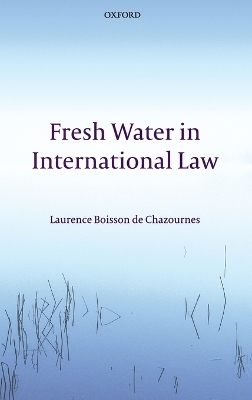
Fresh Water in International Law
Seiten
2013
Oxford University Press (Verlag)
978-0-19-956508-5 (ISBN)
Oxford University Press (Verlag)
978-0-19-956508-5 (ISBN)
- Titel ist leider vergriffen;
keine Neuauflage - Artikel merken
Fresh water is an environmental, economic, social, and cultural commodity. This book provides a thorough assessment of its protection, management, and uses in international law. It explores the international, regional, and national regulatory frameworks that make up the international legal regime regulating fresh water.
This book addresses the diverse ways in which international law governs the uses, management, and protection of fresh water. The international law of fresh water is most comprehensively understood in the light of the different bodies of norms applicable to these varied uses and functions.
The regulation of fresh water has primarily developed through the conclusion of treaties concerning international watercourses. Yet a number of other legal regimes also apply to the governance of fresh water. In particular, there has been an increasing recognition of the importance of fresh water to environmental protection. The development of international human rights law and international humanitarian law has also proven crucial for ensuring the sound and equitable management of this
resource. In addition, the economic uses of fresh water feature prominently in the law applicable to watercourses, while water itself has become an important element of the trade and investment regimes. These bodies of rules and principles not only surface in an array of dispute settlement mechanisms, but
also stimulate wider trends of institutionalization.
The book investigates the origin and scope of these bodies of norms as they apply to fresh water, and demonstrates how they connect and adapt to one another, forming an integrated body of international principles. This approach is accompanied by a detailed analysis of the practice of states and of international organizations, taking into account the activities of the many non-state actors involved in the treatment of fresh water.
This book addresses the diverse ways in which international law governs the uses, management, and protection of fresh water. The international law of fresh water is most comprehensively understood in the light of the different bodies of norms applicable to these varied uses and functions.
The regulation of fresh water has primarily developed through the conclusion of treaties concerning international watercourses. Yet a number of other legal regimes also apply to the governance of fresh water. In particular, there has been an increasing recognition of the importance of fresh water to environmental protection. The development of international human rights law and international humanitarian law has also proven crucial for ensuring the sound and equitable management of this
resource. In addition, the economic uses of fresh water feature prominently in the law applicable to watercourses, while water itself has become an important element of the trade and investment regimes. These bodies of rules and principles not only surface in an array of dispute settlement mechanisms, but
also stimulate wider trends of institutionalization.
The book investigates the origin and scope of these bodies of norms as they apply to fresh water, and demonstrates how they connect and adapt to one another, forming an integrated body of international principles. This approach is accompanied by a detailed analysis of the practice of states and of international organizations, taking into account the activities of the many non-state actors involved in the treatment of fresh water.
Laurence Boisson de Chazournes is Professor of International Law at the University of Geneva. She is an adviser to various international organizations and governments, and has held international assignments as counsel, expert and arbitrator before the International Court of Justice (ICJ) and other judicial fora.
1. Introduction ; 2. Regulation of Fresh Water Uses: Evolution, Scope, and Developments ; 3. Economization of the Law Applicable to Fresh Water ; 4. Environmentalization of the Law Applicable to Fresh Water ; 5. Humanization of the Law Applicable to Fresh Water ; 6. Institutionalization Trends in Fresh Water Governance ; 7. Dispute Settlement and Fresh Water: Trends, Means, and Practice ; 8. Looking Ahead: Trends and Prospects
| Erscheint lt. Verlag | 1.10.2013 |
|---|---|
| Verlagsort | Oxford |
| Sprache | englisch |
| Maße | 161 x 241 mm |
| Gewicht | 600 g |
| Themenwelt | Naturwissenschaften ► Biologie ► Ökologie / Naturschutz |
| Recht / Steuern ► EU / Internationales Recht | |
| Recht / Steuern ► Öffentliches Recht ► Völkerrecht | |
| ISBN-10 | 0-19-956508-2 / 0199565082 |
| ISBN-13 | 978-0-19-956508-5 / 9780199565085 |
| Zustand | Neuware |
| Haben Sie eine Frage zum Produkt? |
Mehr entdecken
aus dem Bereich
aus dem Bereich


